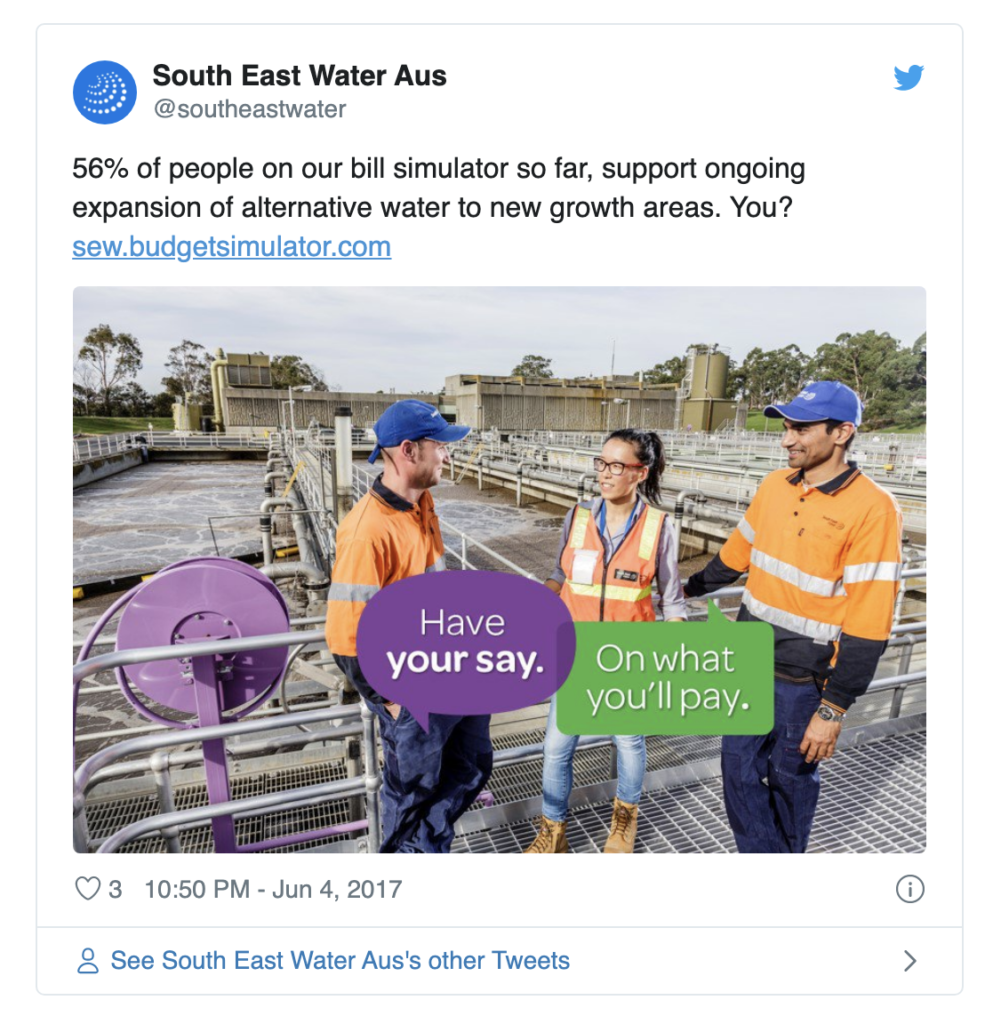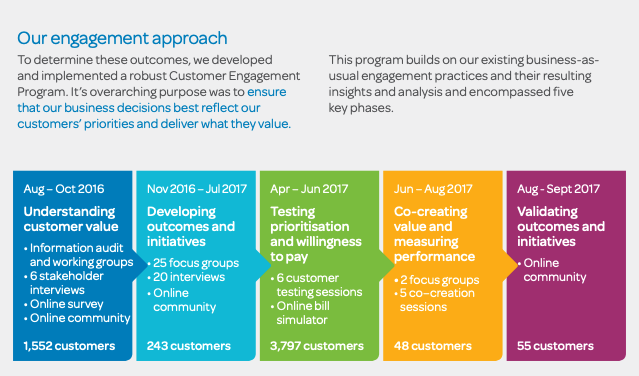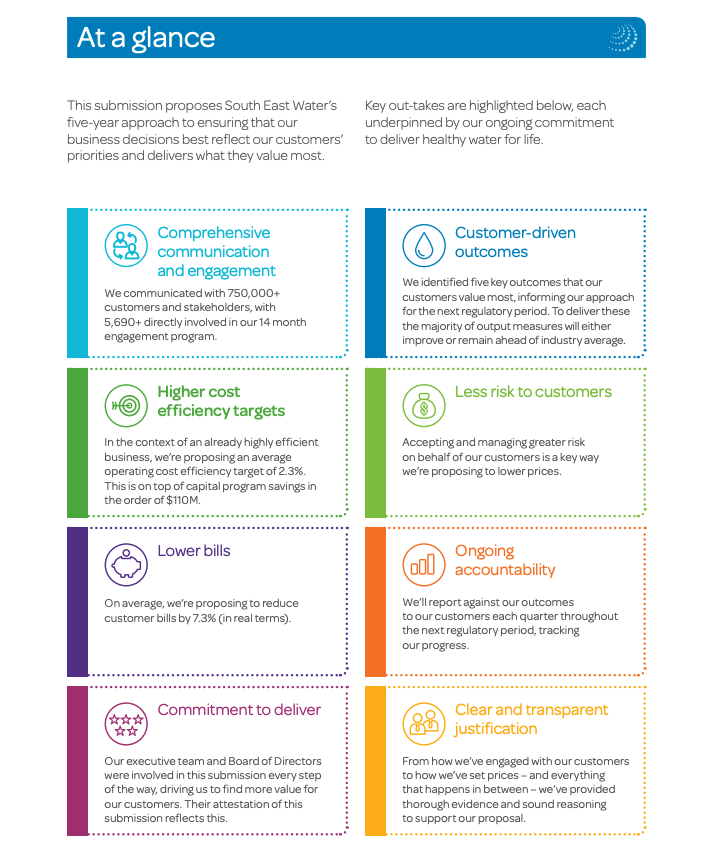
South East Water is a metropolitan water retailer to Melbourne, Australia. In 2017, they submitted a draft Water and Sewerage Price Plan for 2018-2023. Water rates aren’t exactly the most popular of bills, and consumers are often frustrated at the costs involved.
In an effort to try and increase public understanding of costing decisions and the associated process, South East Water undertook a huge consultation and engagement effort with the public surrounding the draft Plan.
One of the tools they employed was Simulator: a digital prioritisation tool which enables the public to simulate the complex decisions public organisations have to make. It has three formats: points; bill; and budget. South East Water opted for a Bill Simulator. Participants are given a base bill amount, and move sliders left or right to allocate or remove money to and from services, resulting in an amount they’d be willing to pay for the services they wish to receive. Embedded information and impacts of each allocation that appear throughout the exercise enable participants to learn about the bill pricing process as they take part, leading to greater understanding of where their money goes and why they need to spend it.

By complementing traditional engagement approaches with leading digital tools like Simulator, the results and participation rates weren’t just impressive – they overwhelmingly exceeded South East Water’s expectations.
Following the submission of the draft Plan, South East Water’s Customer Strategy and Digital Transformation Manager, Beverley de Kretser, generously sat down to talk to Delib and share her reflections on the customer engagement exercise, its process and its successes.
One of the challenges we had was understanding their willingness to pay for them and what trade-offs, if any, they might make – Bill Simulator provided a great way for us to do this.
Beverley de Kretser
“We implemented a robust customer engagement program to ensure our business decisions best reflect our customers’ priorities and deliver what they value most,” she said. Overall, the engagement process took 14 months and was overseen by an independent Customer Engagement Council. There were five key phases to the process, with the insights of each phase informing the approach and focus for the next. Bill Simulator took place in the third phase, ‘testing prioritisation and willingness to pay’.

“While earlier phases of our engagement empowered customers to define value and develop initiatives to deliver on [these priorities], one of the challenges we had was understanding their willingness to pay for them and what trade-offs, if any, they might make – Bill Simulator provided a great way for us to do this,” said Beverley.
The decision to use Simulator as a major consultation tool provided South East Water with the opportunity to engage a greater cross-section of its customers in a unique, convenient and cost-effective way. This phase of their engagement process was remarkably successful, garnering more contributions than all the other phases combined. All in all, nearly 4000 people responded to the Simulator. “We’d seen the participation rates for Bill Simulator and similar engagement tools and knew our target of 1,000 participants was ambitious – so you can imagine how astounded we were to see nearly four times that response rate along with some great feedback from customers on our approach,” Beverley said. Over 90 per cent of respondents took the time to provide additional detail to just moving the sliders, including free text comments and demographic information, resulting in a wealth of meaningful data and feedback.
Success of that caliber doesn’t come without hard work, and perhaps the key is knowing exactly the best areas in which to invest that effort. For Beverley and the team at South East Water it came down to two elements: refining the user experience, and effectively communicating the opportunity to participate with the public.
We knew our target of 1,000 participants was ambitious – so you can imagine how astounded we were to see nearly four times that response rate along with some great feedback from customers on our approach.
Beverley de Kretser
“At South East Water, we’re focused on continually improving our customers’ experience, whether that’s through digital and/ or traditional interactions… Simulator was no exception – we knew participation was dependent on simple, effortless, meaningful, and intuitive engagement. We had to get the user experience right.”
Simulator is designed with both the participant and the administrator in mind. It’s simple, easy to understand visually with a game-like interface, and there are a whole host of opportunities for its admins to insert information – meaning the user is able to understand the different elements involved in making a complex decision. It’s also fully responsive, meaning it works on desktop, mobile and everything in between, meaning it’s accessible from anywhere. However, Beverley and the team wanted to be extra sure they got every customisable element of their Simulator exactly right.
To do this, the team conducted extensive user experience (UX) testing, ranging from trials internally with staff and their Customer Engagement Council, to conducting one-on-one UX sessions with customers through their research partner GfK. These sessions involved customers from different demographic backgrounds testing the Simulator across different devices.

The insights from all these testing efforts led to a crucial decision to delay the Simulator release date so that they could make further improvements. In particular, they wanted to ensure it was clearer and less jargon-heavy for respondents, which meant refining their language and questioning style and developing an introductory video to ensure customers fully understood the exercise.
“We knew delaying the Bill Simulator would impact our overall engagement program timings, but not getting the user experience right would have been a much bigger risk,” said Beverley.
Having such a well-considered UX was only worth doing if they got the Simulator in front of as many citizens as possible. To best cater for the high cultural and linguistic diversity of its customer base, South East Water ran targeted print and social media ads in the top three languages other than English in its region. The Facebook advertisements – both in English and other languages, resulted in high online conversion rates.
Bill Simulator not only made this phase of the engagement easier and cost-effective for us, the participation rates and feedback indicate it was appreciated by our customers too– now that’s value for everyone.
Beverley de Kretser
A radio interview on Melbourne’s most popular morning talkback station exposed Bill Simulator to hundreds of thousands of listeners, and helped attract complimentary local newspaper coverage. Employees and community facilities also helped promote the Bill simulator handing out business-style card promotions in public spaces like train station and libraries. They also sent out a mass direct email marketing campaign using their own communication programme, ‘Have your say’.
No doubt the multi-channel approach, along with their laser focus on user experience, helped achieve enviable results of participation from stakeholders and the community. Over 5,690 customers were directly involved in South East Water’s 14 month program, nearly 4,000 of which chose Bill Simulator as their preferred way to have their say.
At the end of our time together Beverley reflected, “understanding and researching willingness to pay is challenging at the best of times, and it’s even trickier to encourage participation when you’re exploring low engagement services like water and sewage. Bill Simulator not only made this phase of the engagement easier and cost-effective for us, the participation rates and feedback indicate it was appreciated by our customers too– now that’s value for everyone.”
If you’d like to talk to Delib about how Simulator could be used in your organisation, you can book a free demo and one of our staff will walk you through it. We’re very friendly.